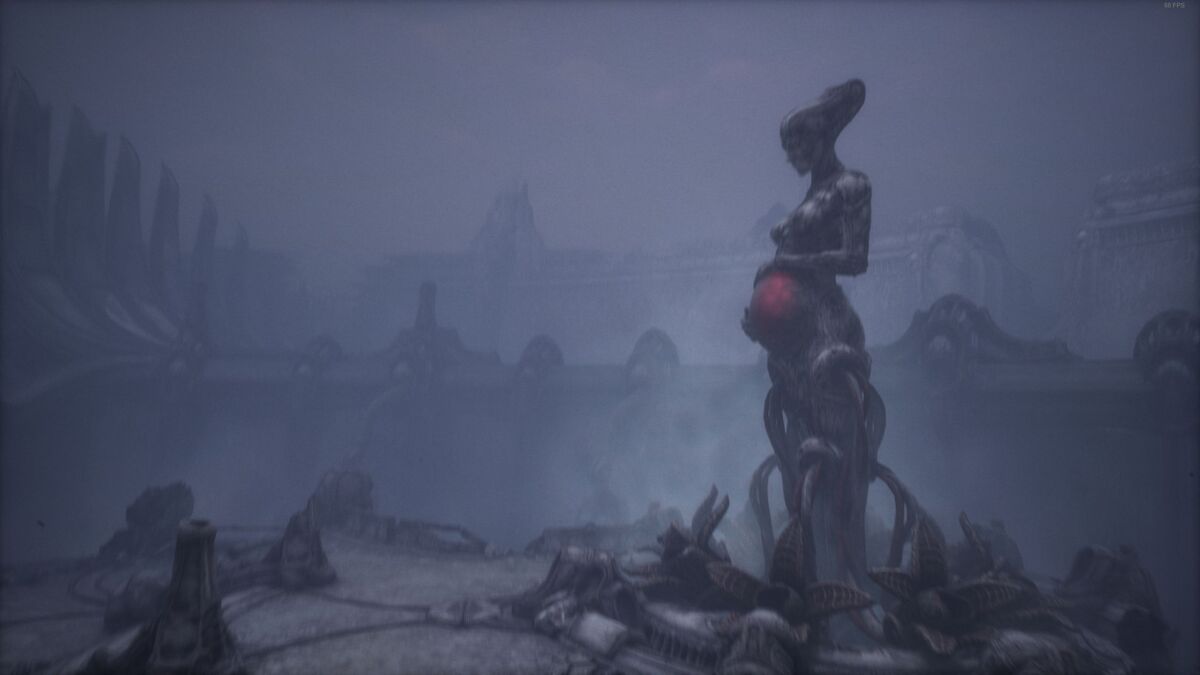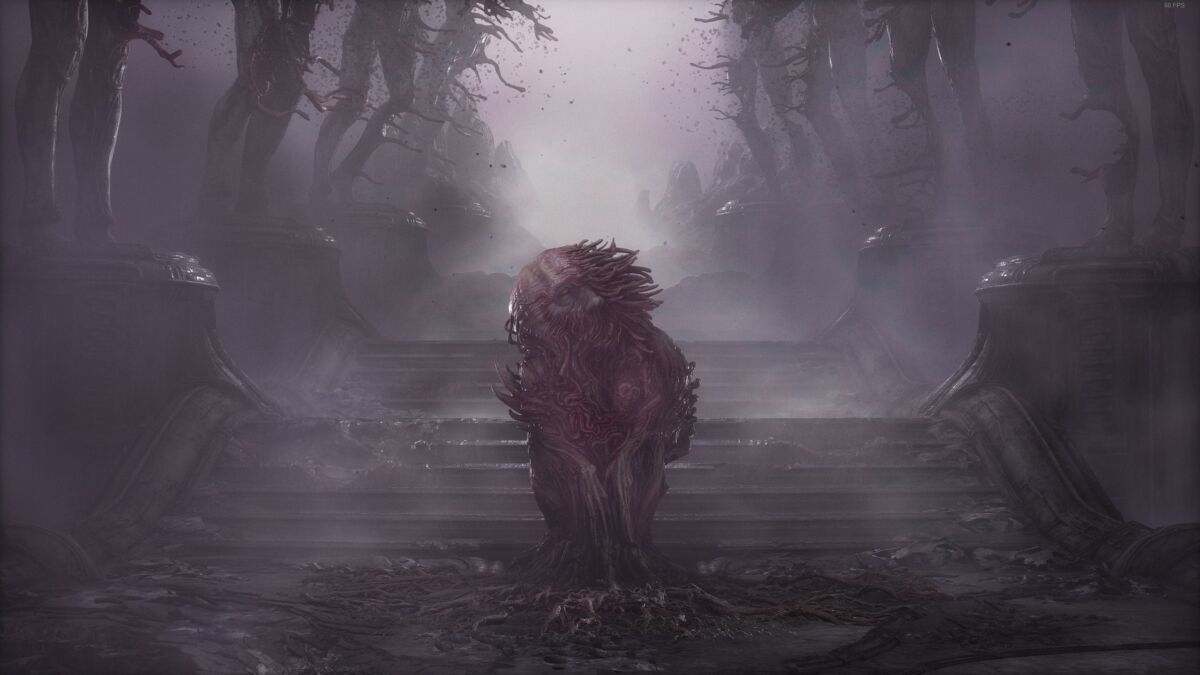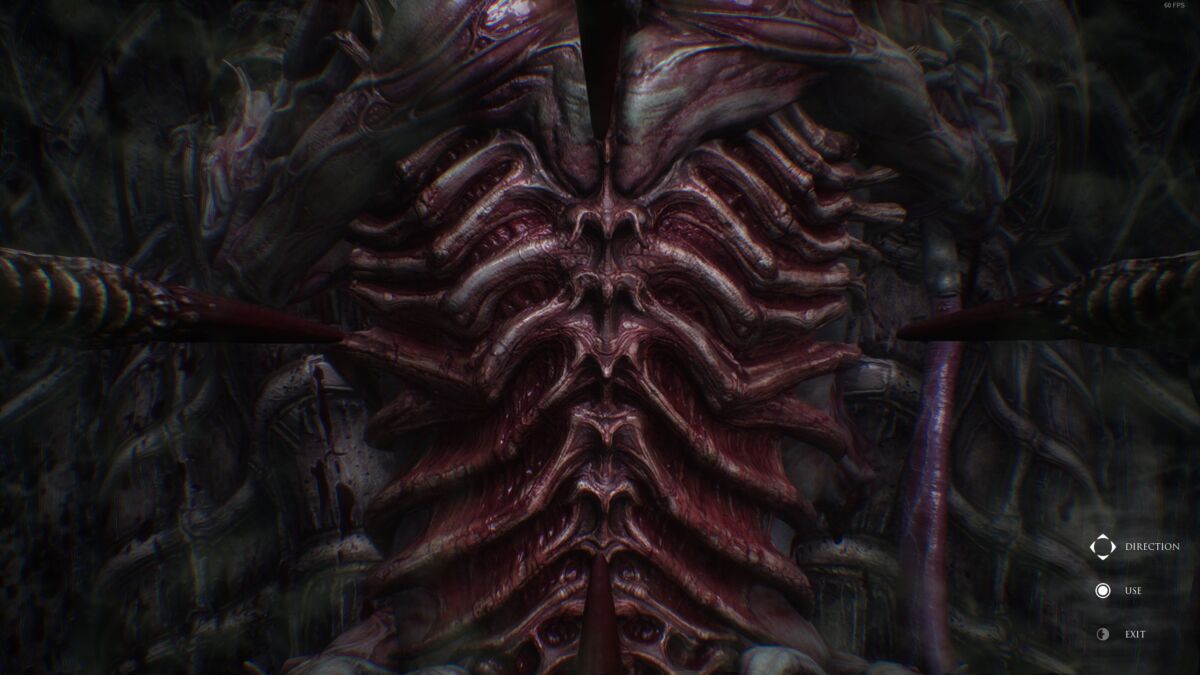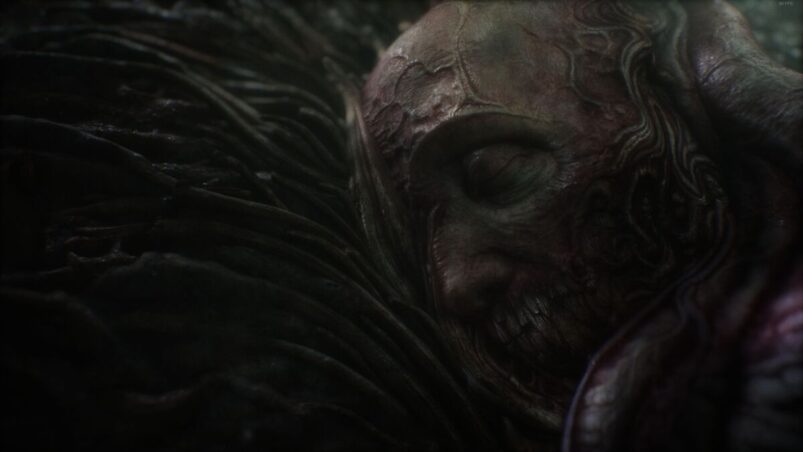
Scorn is a game that’s designed to create conversation, especially seeing as how the game doesn’t have a single spoken or written word to be heard or read. Nothing has a given name and nothing is spelled out. Players have to put a lot of the pieces together themselves, including what Scorn’s ending means.
Just before the credits roll on Scorn, you find yourself torn from your uninvited guest (who we’ll call Leonardo, because he’s like a turtle shell on you), themselves possibly the same character you played as in the game’s first act. With your guts hanging out, you’re seemingly tortured by some patriarchal figure, who dices you up and removes your brain, joining it some kind of neural network. However, two pregnant “women” save you and you’re carried out of the temple, possibly to a new life away from this crumbling civilization, but not before Leonardo pounces and you become an amorphous blob, possibly looping back to the very start of the game.
But what does all this mean? What is Scorn’s story really about? Well, seeing as how the game’s developers, Ebb Software, won’t spell it out, a lot of theories can be made about Scorn’s themes, setting, and story. Here’s Scorn explained — at least what we think is going on in this hideously beautiful hellscape.
Scorn Is About Parenthood

The most pressing theme in Scorn seems to be one of parenthood, with everything everywhere seemingly related to sex and birth in some way. Many of the environments look like birth canals and a lot of the tools you will use are phallic. You could even argue that some of the enemies are designed to look especially fetal and featureless, like they aren’t fully formed.
Act 4’s “elevator” creature is definitely supposed to signify some kind of maternal figure, right down to the caesarean method of opening them up so you can progress. They even stare at you with implied understanding of sorts when you hurt them, a mother who’s still able to love someone who brings them pain.
This all suggests that the world of Scorn is one so streamlined that everything in this civilization is created in service of the next thing above it in the food chain, like a mass production line of people and animals, all serving some kind of purpose and nothing deviating from the course. This could be a sociological dig from Ebb at the “nuclear family,” which could be viewed as state propaganda to create a steady trickle of taxpayers who all fit a cultural ideal.
You are a child of this dead planet who doesn’t want to stay within the hive, acting as a metaphor for being yourself in our own world.
Scorn Is About Letting Go

As much as Scorn is about parenthood, it’s also about how parents can (perhaps harmfully) pass on their own prejudices and beliefs from one generation to the next, essentially stopping people from really having free thought and expression, with them being made in their parents’ image.
Leonardo is the exemplar of this theory, your progenitor who’s seen the bad stuff and doesn’t want you to go out in the wide world as it wronged them in the past. Them clinging to you forcefully shows how difficult it is to let go of your child, for them to go on and become their own person when they know what’s out there. Parents can be guilty of coddling their children too much — Scorn quite viscerally shows what happens when that grip is too tight.
The final, deeply impactful shot of Scorn shows you and Leonardo having become part of one uniform mass, unable to move, showing how not letting go can stop any expression, potentially about to do it all over again in the next cycle, nothing being learned or gained.
Scorn Is About Society

While more of a broader theory, there’s a lot of hints in Scorn that suggest its designers aren’t happy or content with the way current society operates, how creativity and free thought can often be stifled for diverting from common beliefs and the way of doing things.
Scorn’s civilization seems to be one that relied entirely on everything being in the right place and doing the right thing, with no expression or individualism allowed, all brains becoming part of one hivemind. That rigid way of functioning seems to be what’s caused Scorn’s world to crumble, with the society so stuck in its ways that it forgot to advance, the same mistakes being repeated over and over again, and nothing changes, at least in a good way.
After all, how many of humanity’s innovations and advancements would have been accomplished without the free thinkers? Sometimes you need to light a fuse to make a bang.
Scorn’s grotesque imagery also backs up it being a commentary on how sterile society and culture may appear to some in terms of art and entertainment, with so much art being iterative of something else, especially in the mainstream. You could even suggest that it’s an anti-censorship statement, as the main character’s mouth is fused together and every time they try to do something different, they meet violent opposition.
There’s a lot to unpack in Scorn, so much so that you could probably infer a new meaning or theme on multiple playthroughs. While probably not for everyone, it’s still a unique work that’s worth experiencing at least once.
Scorn is available on PC, Xbox Series X & S, and Xbox One.
READ NEXT: 25 Best Free Horror Games of All Time
Some of the coverage you find on Cultured Vultures contains affiliate links, which provide us with small commissions based on purchases made from visiting our site.

